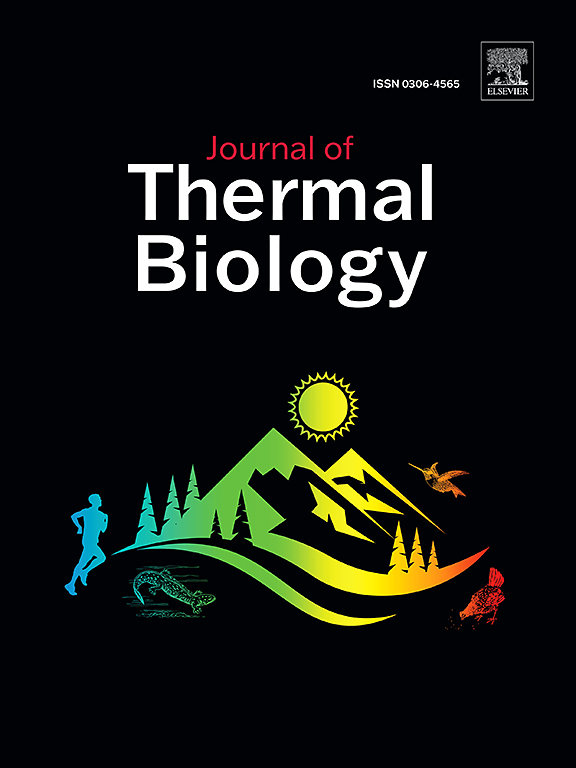Genetic polymorphism in the HSP90AA1 gene revealed in indigenous cattle adapted to tropical coastal climate
IF 2.9
2区 生物学
Q2 BIOLOGY
引用次数: 0
Abstract
Heat stress proteins are important factors in protecting the cells of animals and humans against environmental stress, leading to cellular homeostasis. Zebu cattle are well known for the prevalence of novel mutations responsible for heat tolerance. Hence, the study was carried out to identify single nucleotide polymorphisms in the heat shock protein gene (HSP90AA1) in Shweta Kapila, Sahiwal, Gir and Malnad Gidda cattle breeds adapted to hot and humid coastal climate. Blood samples were collected and genomic DNA amplified for HSP90AA1 gene using designed oligonucleotide primers and sequenced. Rectal temperature and respiration rate both were observed elevated during the hot period compared to the cold period. Sequence data of all the amplified regions of HSP90 gene was analyzed using EditSeq and SeqMan of LASERGENE software. The analysis of custom sequencing data unveiled the presence of ten novel Single Nucleotide Polymorphisms SNPs) located at g.G4733C, g.C4765A and g.A4848G in 3′ UTR; g.C1012T and g.A1209G in exon 3; g.C1300T in intron 3; g.C2245T and g.T2266G in exon 5; and g.T3814A and g.G4212T in exon 10. The identified SNPs were genotyped by PCR-RFLP (AciI and HpyCH4III enzymes) and Tetra-primer ARMS-PCR. Genotypic and allelic frequencies for the regions ranged between 0.094 and 0.760, and 0.2645 to 0.7355, respectively. This was the novel report of genetic variations in the HSP90AA1 gene in selected indigenous cattle breeds of India adapted to hot and humid coastal climates. Further studies with large sample sizes are needed to genotype the loci for their significant effect on thermotolerance ability in cattle.
适应热带沿海气候的土生牛HSP90AA1基因的遗传多态性
热应激蛋白是保护动物和人类细胞免受环境应激的重要因素,导致细胞稳态。Zebu牛是众所周知的新突变负责耐热性的流行。因此,本研究旨在鉴定适应沿海湿热气候的Shweta Kapila、Sahiwal、Gir和Malnad Gidda牛品种热休克蛋白基因(HSP90AA1)的单核苷酸多态性。采集血样,用设计的寡核苷酸引物扩增HSP90AA1基因基因组DNA并测序。与冷期相比,热期观察到直肠温度和呼吸速率均升高。利用LASERGENE软件的EditSeq和SeqMan对HSP90基因所有扩增区域的序列数据进行分析。定制测序数据分析显示,在3′UTR中存在10个新的单核苷酸多态性(snp),分别位于g.G4733C、g.g 4765a和g.g a4848g;外显子3中的g.C1012T和g.A1209G;内含子3中的g.C1300T;第5外显子中的g.C2245T和g.T2266G;g.T3814A和g.G4212T位于外显子10。通过PCR-RFLP (AciI和HpyCH4III酶)和四引物ARMS-PCR对鉴定的snp进行基因分型。基因型频率和等位基因频率分别为0.094 ~ 0.760和0.2645 ~ 0.7355。这是对适应炎热潮湿沿海气候的印度本土牛品种的HSP90AA1基因遗传变异的新报道。由于这些位点对牛的耐热性有显著影响,因此需要进一步的大样本量的研究来对它们进行基因分型。
本文章由计算机程序翻译,如有差异,请以英文原文为准。
求助全文
约1分钟内获得全文
求助全文
来源期刊

Journal of thermal biology
生物-动物学
CiteScore
5.30
自引率
7.40%
发文量
196
审稿时长
14.5 weeks
期刊介绍:
The Journal of Thermal Biology publishes articles that advance our knowledge on the ways and mechanisms through which temperature affects man and animals. This includes studies of their responses to these effects and on the ecological consequences. Directly relevant to this theme are:
• The mechanisms of thermal limitation, heat and cold injury, and the resistance of organisms to extremes of temperature
• The mechanisms involved in acclimation, acclimatization and evolutionary adaptation to temperature
• Mechanisms underlying the patterns of hibernation, torpor, dormancy, aestivation and diapause
• Effects of temperature on reproduction and development, growth, ageing and life-span
• Studies on modelling heat transfer between organisms and their environment
• The contributions of temperature to effects of climate change on animal species and man
• Studies of conservation biology and physiology related to temperature
• Behavioural and physiological regulation of body temperature including its pathophysiology and fever
• Medical applications of hypo- and hyperthermia
Article types:
• Original articles
• Review articles
 求助内容:
求助内容: 应助结果提醒方式:
应助结果提醒方式:


